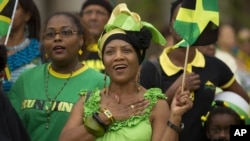The process to sever ties with the British monarchy is underway, following in the footsteps of another former Caribbean possession, Barbados.
So there is little excitement in Jamaica about the lavish coronation ceremony taking place in London on May 6.
"It doesn't mean anything to me because I don't see what they are doing for us here in Jamaica," said Claudeth Brown, 68, who sells peanuts and cold drinks in the capital Kingston.
Carpenter David Brown, 65, had similar feelings.
"If we have independence, why would we need another head of state from abroad?" he said as he caught sardines in Kingston Harbor during a day off work.
With a bitter history of slavery and a plantation economy that made some Britons wealthy but left many Jamaicans impoverished, the relationship with Britain is not always seen as having been happy and glorious.
Jamaica first came into England's hands in 1655 when it was seized from Spain, which had brought over the first Africans as slaves.
About 600,000 Africans were brought to Jamaica as slaves between the 15th and 19th centuries to work on sugar, cotton and banana plantations, the National Library of Jamaica says.
The British government was involved in the Atlantic slave trade and reimbursed plantation owners for the loss of labor that occurred when slavery was outlawed in 1834.
It gained independence in 1962 but retained the British monarch as head of state and stayed in the Commonwealth. In the years since it has often been racked by political and criminal violence.
Waves of immigration to Britain kept the links alive as did an affection for Queen Elizabeth, who was on the throne at the time of independence.
But even before Elizabeth's death last September, republican sentiment was increasingly gripping the Caribbean region.
Jamaican Prime Minister Andrew Holness has said his country is "moving on". In March he announced a constitutional reform committee that will assist in the transition.
"We will be one step further in redefining who we are as a country and as a sovereign people," he said.
Breaking ties with the monarchy is essential for Jamaica, said Steven Golding, president of the UNIIA-ACL, a Black nationalist organization founded in Jamaica by activist Marcus Garvey.
"Given the atrocities that we suffered through the period of enslavement, through the colonial period, I think it is the final piece of the puzzle when it comes to our sovereignty as an independent nation," he said.
In order to become a republic Jamaica's Constitution requires a 2/3 majority in both the elected and nominated Houses of Parliament and a simple majority in a general referendum, said constitutional expert Lloyd Barnett.
However, if it obtains a 2/3 majority in the elected House but only a simple majority in the nominated House it will require a 2/3 majority of the electorate in a referendum.
A 2022 survey by pollster Don Anderson found that 56% of Jamaicans want to remove the monarch as head of state.
"Jamaicans are more attuned to the situation now and probably more inclined to wish for and to support the separation from the monarchy," Anderson told Reuters.





